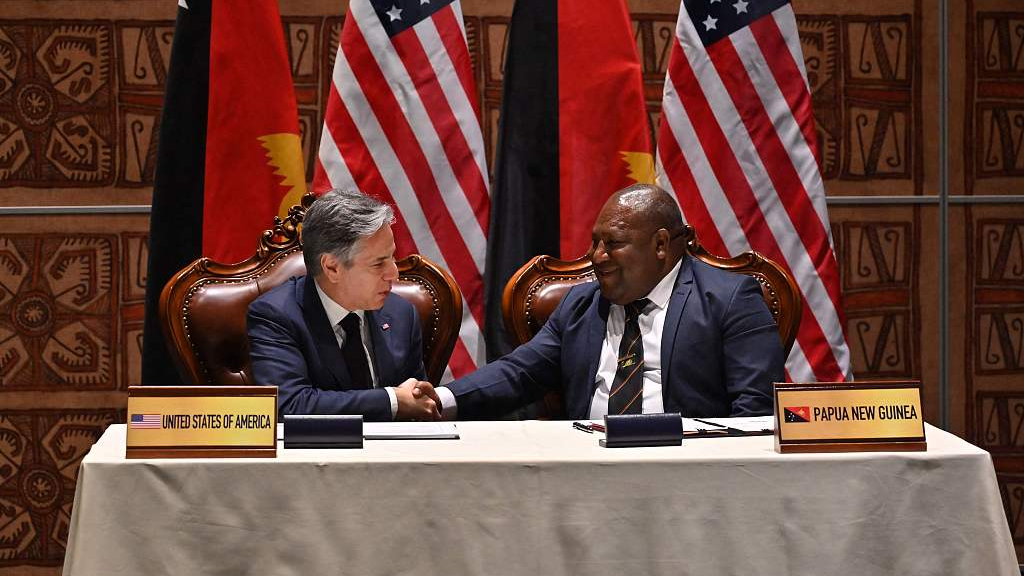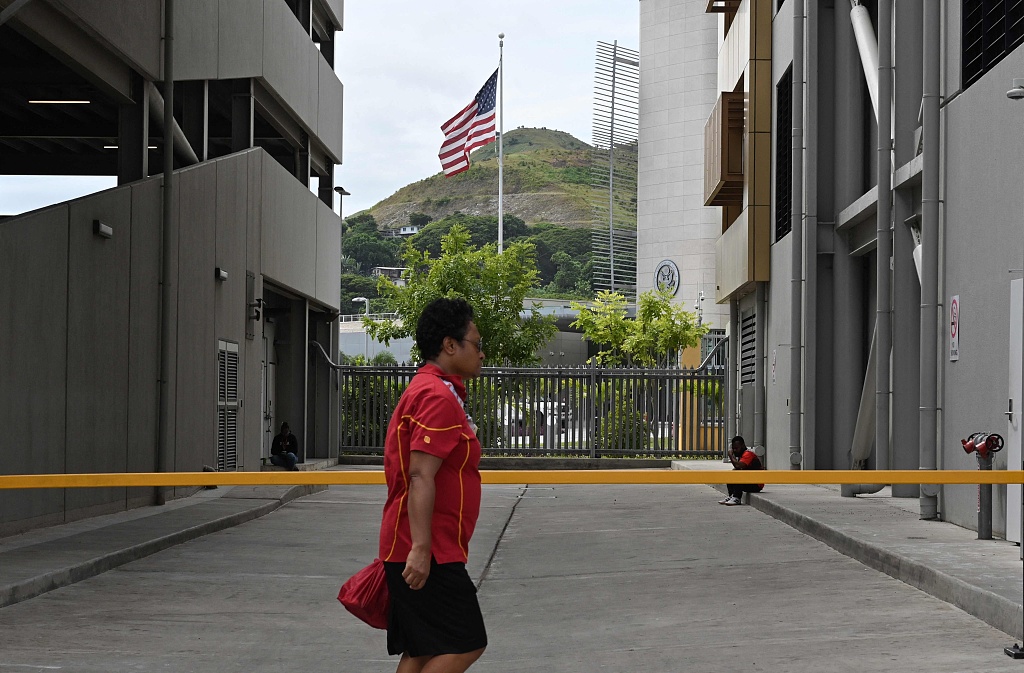
U.S. Secretary of State Antony Blinken (L) and Papua New Guinea's Defence Minister Win Bakri Daki shake hands after signing a security agreement at the Forum for India-Pacific Islands Cooperation in Port Moresby, Papua New Guinea, May 22, 2023. /CFP
U.S. Secretary of State Antony Blinken (L) and Papua New Guinea's Defence Minister Win Bakri Daki shake hands after signing a security agreement at the Forum for India-Pacific Islands Cooperation in Port Moresby, Papua New Guinea, May 22, 2023. /CFP
Editor's note: Keith Lamb, a special commentator on current affairs for CGTN, is an independent international relations analyst who focuses on global inequality and China's socialist development. He is a University of Oxford graduate with a Master of Science in Contemporary Chinese Studies. The article reflects the author's opinions and not necessarily the views of CGTN.
The U.S. and the Pacific nation Papua New Guinea, have signed a new security pact, the full version of which will reportedly only be made public in a couple of months! With such secrecy, no wonder this pact has sparked protests in the country as the populace worries about increasing militarization in the region.
Protesters with good reason are worried that the U.S. could come into the country without permission. The Guardian reported that a leaked draft copy of the defense cooperation agreement shows that the pact will give U.S. personnel and its contractors legal immunity while allowing military equipment, operated by the U.S., to move freely within Papua New Guinea's territory and territorial waters. Furthermore, U.S. staff will be exempt from all migration requirements.
Papua New Guinea's Prime Minister James Marape has said that the agreement has nothing to do with geopolitics and is all about improving the country's security cooperation. Likewise, the U.S. side has talked of enhancing Papua New Guinea's humanitarian and disaster response capabilities.
However, this explanation doesn't stand up to scrutiny and, clearly, geopolitical factors are at play. News reports point to the geopolitical importance of Papua New Guinea, located to the north of Australia and for an agreement of only $45 million, paltry by international standards, supposedly sending President Joe Biden to visit the country seems like a massive deal. In the end, Biden pulled out due to staying in the U.S. to discuss debt limitation talks at home and Antony Blinken went to do the deal instead.
Coincidently, Papua New Guinea was hosting India's Prime Minister Narendra Modi, at the time of the signing of the pact. India and the U.S. are members of the QUAD alliance, which seeks to counter China in the Indo-Pacific, adding more fodder to the argument that the security pact with Papua New Guinea is precisely about geopolitical gaming and not humanitarian aid. Superficially, $45 million is involved, but off the books, the cost of the immense arsenal of U.S. military equipment and personnel passing through the country could be much more.

The U.S. embassy in Port Moresby, Papua New Guinea, May 19, 2023. /CFP
The U.S. embassy in Port Moresby, Papua New Guinea, May 19, 2023. /CFP
The problem with partnering with the U.S. is the question of reliability. The press reports of Biden staying at home have opened up doubts for the Papua New Guinean side in regards to U.S. credibility, but I'm talking about the long-term historical record. The U.S. has historically colonized the region and still administers islands such as Guam and American Samoa, which are far from its mainland.
Indeed, Hawaii became incorporated into the U.S. as late as 1959. As such, anyone doing deals with the U.S. should be wary that the U.S. has a history of making small incursions that seem insignificant at first but lead to monumental negative consequences over time. The shorter historical record doesn't look better either. U.S. security support can turn against the recipient, leading to invasion and resource plundering based on humanitarian pretexts.
Needless to say, Papua New Guinea, which has billion-dollar gold and petroleum exports, as a developing country, has plenty of contradictions that could be leveraged at any time against it to create a pretext for "intervention." China is currently Papua New Guinea's second-largest trade partner after Australia, but what will happen when China inevitably becomes its largest partner?
Today, the U.S. is involved in a proxy war with Russia. With the Nord Stream pipeline destroyed, Europe is at the mercy of expensive U.S. energy imports and its industrial output and living standards are declining. The U.S. would happily bring this same chaos to East Asia and the Pacific region. Indeed, this scheming is the very worry I have when the U.S. comes to do deals in the Indo-Pacific region. Today it could be military aid while tomorrow it will be U.S. military bases.
The fact is the U.S. has a poor record of providing humanitarian assistance. A leader in bringing humanitarian aid and development to the world is in fact China. In Papua New Guinea, China has invested in its Telecoms industry and built airports, highways, and schools. It is this positive development which is part of the reason citizens have protested against the U.S. pact. They fear, as I do too, that this pact is an anti-Global South pact that seeks to maintain U.S. hegemony.
(If you want to contribute and have specific expertise, please contact us at opinions@cgtn.com. Follow @thouse_opinions on Twitter to discover the latest commentaries in the CGTN Opinion Section.)